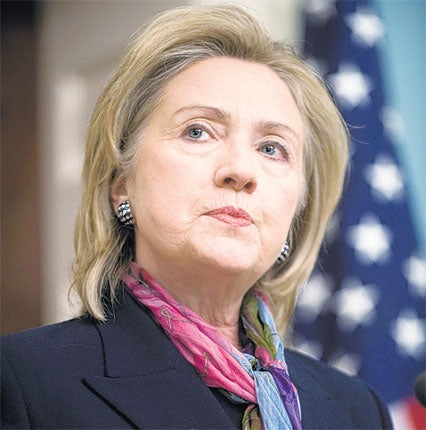Clinton calls home US envoys in post-mortem on WikiLeaks crisis

Your support helps us to tell the story
From reproductive rights to climate change to Big Tech, The Independent is on the ground when the story is developing. Whether it's investigating the financials of Elon Musk's pro-Trump PAC or producing our latest documentary, 'The A Word', which shines a light on the American women fighting for reproductive rights, we know how important it is to parse out the facts from the messaging.
At such a critical moment in US history, we need reporters on the ground. Your donation allows us to keep sending journalists to speak to both sides of the story.
The Independent is trusted by Americans across the entire political spectrum. And unlike many other quality news outlets, we choose not to lock Americans out of our reporting and analysis with paywalls. We believe quality journalism should be available to everyone, paid for by those who can afford it.
Your support makes all the difference.Hillary Clinton, the US Secretary of State, has summoned more than 260 US ambassadors and envoys from every corner of the globe for a week of brainstorming and re-evaluation in Washington, just as America's sprawling diplomatic machine is facing crises on several fronts at once, not least thanks to the work of WikiLeaks.
The unprecedented gathering at the State Department began yesterday and brought together America's most senior diplomatic representatives from 180 countries. Most have been told to stay in Washington all week for a series of meetings and pep talks. Ms Clinton is set to address them tomorrow and will have face-to-face meetings with envoys from front-line countries where the stakes for America are highest.
Officials stayed quiet about the initial purpose saying only that Ms Clinton was anxious to complete planning for 2011. However, it comes at a time of multiple challenges for the US in its foreign dealings, including the growing clamour on Capitol Hill for cuts in foreign aid and the impact of the turmoil in Egypt on Middle East policy. That is not to forget the running sores of Iran and North Korea or the perils of American policy in Afghanistan and Pakistan.
With no end in sight to the slow drip of diplomatic cables from WikiLeaks, the State Department cannot assess the full extent of the damage done to its operations. Earlier this month, the ambassador to Libya, Gene Cretz, returned to Washington after complaints from Tripoli about some of his cables regarding Muammar al-Gaddafi, the Libyan leader. There may be other senior ambassadors who this week will be canvassed on whether the WikiLeaks revelations have made their jobs untenable.
While President Barack Obama focuses on domestic issues as he nears the start of his re-election campaign, Ms Clinton is almost alone in the foreign policy storm surrounding her. Only a few days ago she commented that she had not committed to staying in her job should Mr Obama get a second term.
Most pressing right now is Egypt, with some commentators warning that America will take the blame if it tips towards an Islamic revolution as seen in Iran in 1979. In one of several TV interviews at the weekend, Ms Clinton said she wanted "real democracy" to emerge in Egypt, "not a democracy for six months or a year and then evolving into essentially a military dictatorship or a so-called democracy that then leads to what we saw in Iran".
Discussions about WikiLeaks and the turmoil in the Middle East will not be unrelated. Leaked cables about the abuse of privilege in the ruling class are thought to have contributed to the uprising in Tunisia. Newly released cables addressing the behaviour of some of the sons of Mr Gaddafi are fuelling fears that Libya may not be immune to the wave of anti-government protests in the region.
Officials in Washington yesterday said that the US was formally pressing President Hosni Mubarak of Egypt to announce open elections in September in which he would preferably not be a candidate. It is also pressing for an end to emergency laws in place since 1981 that allow the holding of political prisoners and limit the operations of opposition parties.
There were signs last night of carping in the ranks about the cost of Ms Hillary's mass. Talking to the Politico website, one official questioned why "every ambassador in the world was required to come back to the States for a group of lectures, when this could have been done virtually".
Join our commenting forum
Join thought-provoking conversations, follow other Independent readers and see their replies
Comments